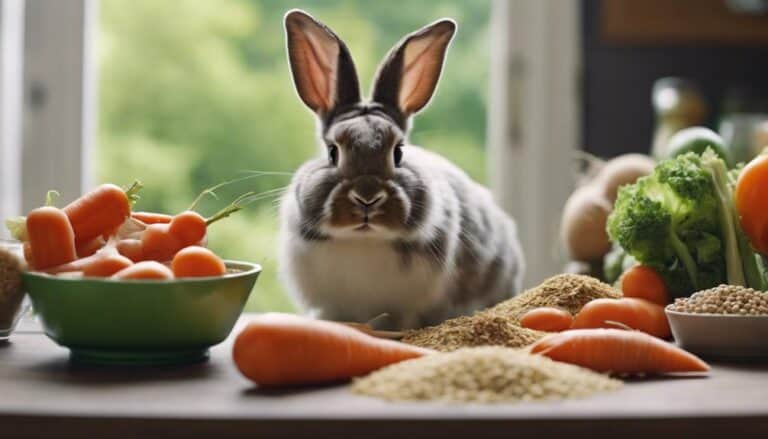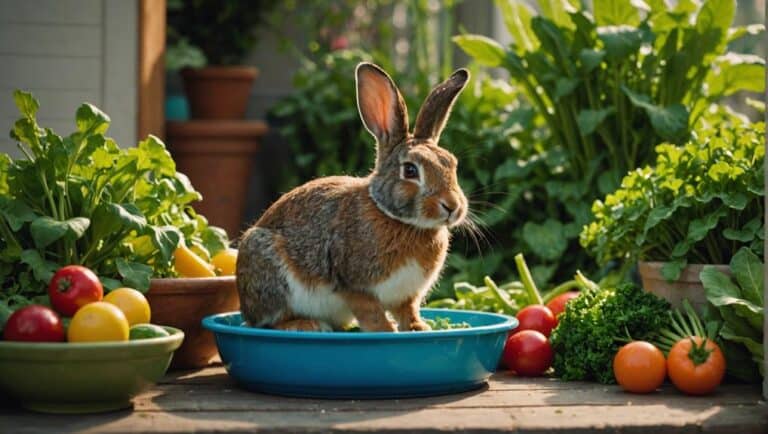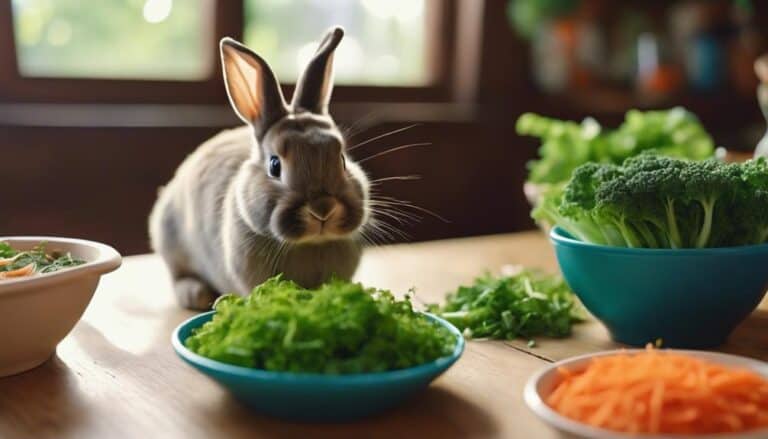Just as a tree needs healthy roots to thrive, your furry friend relies on essential minerals for ideal health. You might not realize how deficiencies in minerals like calcium, zinc, or iron can lead to serious health issues in pets. From weakened bones to dull coats, these imbalances can quietly affect their well-being. Understanding the signs and causes of these deficiencies is vital, so what should you be on the lookout for in your pet's behavior and condition?
Contents
- 1 Overview of Mineral Deficiencies
- 2 Common Mineral Deficiencies in Rabbits
- 3 Causes of Mineral Deficiencies
- 4 Signs of Mineral Deficiencies
- 5 Impact on Skin and Coat
- 6 Dietary Sources of Essential Minerals
- 7 Prevention Strategies for Deficiencies
- 8 When to Consult a Veterinarian
- 9 Importance of Balanced Nutrition
- 10 Final Thoughts
Overview of Mineral Deficiencies

Mineral deficiencies in pets can considerably impact their health and well-being, making it essential for pet owners to be aware of the signs and consequences. Among the most critical deficiencies are calcium, zinc, iron, and copper.
Calcium deficiency, for instance, can lead to weak bones, increasing the risk of fractures, especially in growing pets. Recognizing these symptoms early can help you take action to prevent serious complications.
Zinc deficiency often manifests as skin issues, including hair loss and a weakened immune system, leaving your pet vulnerable to infections.
On the other hand, iron deficiency can cause anemia, resulting in lethargy and reduced energy levels as oxygen transport in the bloodstream diminishes. Ultimately, copper deficiency may lead to a dull coat and impaired immune responses, emphasizing the need for balanced mineral intake.
Understanding these mineral deficiencies is crucial for ensuring your pet's overall health. Keeping a close eye on their diet and consulting with a veterinarian can help you address potential deficiencies before they lead to significant health problems.
Your commitment to their well-being can make all the difference in their quality of life.
Common Mineral Deficiencies in Rabbits
Rabbits require essential minerals like calcium, phosphorus, and potassium for optimal health and well-being. These minerals play a significant role in various bodily functions, including bone development and muscle function; hence, ensuring a balanced intake is essential.
If you notice symptoms like lethargy, weak bones, or muscle weakness in your rabbit, these could indicate mineral deficiencies.
Providing a balanced diet rich in hay and fresh greens is imperative to prevent these issues and support your pet's overall health, as a well-rounded diet encourages healthy behaviors like bunny binkying behavior.
Essential Minerals for Rabbits
Guaranteeing that your rabbit receives the right balance of fundamental minerals is imperative for maintaining their health and vigor.
A well-rounded diet, including fresh hay which should comprise 70-80% of their nutritional intake, helps provide these significant minerals naturally; fresh hay's importance can't be overstated.
Key minerals include calcium and phosphorus, which must be balanced; excess phosphorus can lead to urinary problems and bone issues due to disrupted calcium levels. Magnesium is another essential mineral, as deficiencies can cause muscle spasms, seizures, and poor overall health, playing an essential role in nerve function and energy metabolism.
Additionally, while potassium isn't mentioned in the key minerals, it's vital to recognize that a lack of it can lead to weakness and lethargy since it supports muscle function and metabolic processes. Iron is critical as well; iron deficiency can result in anemia, leading to lethargy, poor coat condition, and a weakened immune response.
Ultimately, zinc plays a significant role in maintaining skin health and immune function. A deficiency can manifest as skin lesions and poor coat quality, increasing susceptibility to infections.
To keep your rabbit healthy, focus on providing a balanced diet rich in these fundamental minerals.
Regularly consult with a veterinarian to guarantee you're meeting your furry friend's nutritional needs.
Symptoms of Deficiencies
Recognizing the symptoms of mineral deficiencies in your rabbit is essential for their well-being. A balanced bunny diet is key in preventing these deficiencies, as a high-fiber diet rich in hay and greens supports overall health.
A calcium deficiency can manifest as weak bones, tooth problems, and muscle twitching, which are all significant signs that require your attention. Phosphorus deficiency may lead to poor growth and reproductive issues, reflecting its importance in energy metabolism and skeletal health.
If you notice your rabbit displaying a loss of appetite, lethargy, or muscle contractions, these could indicate magnesium deficiency, highlighting its role in muscle function and energy production. Moreover, iron deficiency can result in anemia, characterized by weakness, pale mucous membranes, and lethargy, since iron is essential for oxygen transport in the blood.
Zinc deficiency may present as skin issues like dermatitis or hair loss, as this mineral is key for skin repair and immune function.
Preventative Nutritional Strategies
To maintain ideal health in your rabbit, focusing on preventative nutritional strategies is fundamental for combating common mineral deficiencies. Incorporating a diverse range of fresh vegetables, hay, and balanced pellets can significantly reduce the risk of these deficiencies. Regularly consulting a rabbit nutrient deficiency checklist can help ensure that your furry companion is receiving all the essential vitamins and minerals needed for optimal health. Monitoring their diet closely and adjusting it based on the checklist can further enhance their well-being and longevity.
Start by ensuring your rabbit's diet is rich in calcium, as this mineral supports bone health and prevents metabolic bone disease. Include leafy greens like kale and dandelion greens, which are excellent sources of calcium.
Balance phosphorus intake carefully; while it's important for energy and bone health, excessive phosphorus can lead to urinary and skeletal issues. A proper calcium-to-phosphorus ratio is critical.
Magnesium is another key player in your rabbit's health, aiding muscle function and nerve transmission. Incorporate foods such as nuts and seeds, but do so in moderation.
Potassium is necessary for heart and muscle function, so provide plenty of fresh vegetables, such as carrots and bell peppers, to keep potassium levels steady.
Causes of Mineral Deficiencies

Mineral deficiencies in pets can stem from a variety of causes that pet owners should be aware of. One significant factor is nutritional deficiencies caused by poor-quality commercial foods, which often don't meet AAFCO standards. These foods can lack essential minerals like zinc and calcium, leading to health issues over time.
Additionally, digestive diseases, such as pancreatitis or inflammatory bowel disease, can impair nutrient absorption, further exacerbating these deficiencies.
Stress also plays a role; it can disrupt your pet's digestive health and nutrient assimilation, making it vital to maintain a calm environment.
If you rely on homemade diets, be cautious. Without proper mineral supplementation and a balanced variety of ingredients, you might unintentionally create deficiencies in your pet's diet.
Lastly, age-related changes in metabolism can increase the risk of mineral deficiencies, especially in senior pets who may need tailored nutritional diets to meet their unique needs.
Signs of Mineral Deficiencies
Many pet owners may not realize that subtle changes in their furry friends' behavior or appearance can signal underlying mineral deficiencies. Recognizing these signs and symptoms early can greatly impact your pet's health. Nutritional deficiencies often manifest in various ways that affect both their physical condition and overall well-being.
Here are some key indicators to watch for:
- Dull fur or patchy hair loss: Indicating potential copper deficiency.
- Skin thickening and cracking: Often linked to zinc deficiency, leading to increased shedding and infections.
- Muscle twitching or seizures: Suggestive of magnesium deficiency, affecting nerve function.
- Fatigue and pale mucous membranes: Signs of iron deficiency, which can lead to anemia.
Maintaining a balanced intake of essential vitamins and minerals is vital for ensuring your pet enjoys healthy skin and fur, along with robust skeletal and overall health.
If you notice any of these signs, consult your veterinarian for guidance on improving your pet's diet and addressing any deficiencies. Your proactive approach can lead to a happier, healthier life for your furry companion.
Impact on Skin and Coat

When your pet lacks essential minerals, you might notice significant changes in their skin and coat health.
Issues like dull fur, excessive shedding, and skin complications can arise, making them more vulnerable to infections.
Understanding these impacts helps you recognize the importance of proper mineral intake for your furry friend's overall well-being.
Skin Health Complications
A balanced diet is crucial for maintaining your pet's skin and coat health, as deficiencies in key minerals can lead to significant complications.
Both copper deficiency and zinc deficiency can have profound effects on your furry friend's overall skin health and coat quality. When your pet lacks copper, you might notice dull hair and patchy color loss, signaling a decline in coat vigor.
Similarly, zinc deficiency can cause hair loss, along with thickening or cracking of the skin, which compromises its integrity.
To guarantee your pet thrives, consider the following:
- Monitor mineral intake to prevent deficiencies.
- Incorporate copper-rich foods, like organ meats and seafood.
- Include zinc sources such as meat, fish, and whole grains.
- Regularly assess your pet's skin and coat for any changes.
Coat Dullness and Shedding
Skin health directly influences your pet's coat quality, and issues like coat dullness and excessive shedding often signal underlying mineral deficiencies.
A zinc deficiency can lead to hair loss, manifesting as a dull coat and possibly causing thickening or cracking of the skin. Additionally, copper deficiency may alter fur color and texture, resulting in a dry, lackluster appearance.
Essential fatty acids, particularly Omega-3, play a significant role in maintaining healthy skin. Insufficient levels can exacerbate dryness and lead to increased shedding.
Moreover, low calcium levels can negatively impact skin integrity, contributing to overall dullness in your pet's coat. Calcium is critical for skin health, and without it, your furry friend may struggle to maintain a vibrant appearance.
To combat these issues, ensuring your pet receives the proper mineral intake is fundamental. Regularly consulting with your veterinarian can help identify any deficiencies and guide you in selecting a balanced diet tailored to your pet's needs.
Immune System Vulnerability
Mineral deficiencies can greatly compromise your pet's immune system, making them more vulnerable to infections and skin conditions. Essential minerals like zinc, copper, selenium, and magnesium play critical roles in maintaining your furry friend's overall health.
Without them, your pet may face various skin issues and a diminished ability to fight off pathogens.
Consider the following impacts of mineral deficiencies:
- Zinc deficiency can lead to dermatitis and impaired immune function.
- Copper deficiency may result in a dull coat and reduced pigmentation.
- Selenium deficiency weakens antioxidant defenses, increasing oxidative stress on skin health.
- Magnesium deficiency can disrupt hormonal balance, exacerbating skin problems and infections.
When these minerals are lacking, your pet's skin barrier function weakens, making it easier for infections to take hold. This can lead to a cycle of vulnerability where skin issues further compromise the immune system.
Dietary Sources of Essential Minerals
Essential minerals play an important role in your pet's overall health, and ensuring they receive adequate amounts from their diet is fundamental. Meeting your furry friend's dietary requirements is key to prevent nutritional deficiencies in pets that can lead to serious health issues.
Calcium is crucial for bone health and structural integrity, and you can find it in dairy products, leafy greens, and fish with bones.
Iron, on the other hand, is important for oxygen transport and energy production, with sources like red meat, liver, and certain greens such as spinach.
Zinc supports immune function and skin health, and it can be obtained from meat, shellfish, legumes, and seeds.
Magnesium is necessary for muscle and nerve function, and you can include whole grains, nuts, and green leafy vegetables in your pet's diet to fulfill this need.
Lastly, copper is essential for red blood cell formation and helps maintain a healthy coat and skin. You'll find copper in organ meats, seafood, nuts, and whole grains.
Prevention Strategies for Deficiencies

To keep your pet healthy and prevent mineral deficiencies, it's crucial to implement effective prevention strategies. Start by selecting high-quality commercial pet food approved by AAFCO, ensuring it meets your furry friend's nutritional requirements. This minimizes the risk of deficiencies considerably.
In addition to commercial food, consider incorporating a variety of fresh and whole food sources into your pet's diet. This balanced diet can include:
- Meat, fish, and eggs for protein
- Vegetables for essential vitamins and minerals
- Grains for carbohydrates and fiber
- Appropriate supplements, as directed by your veterinarian
Regularly consulting with a veterinarian helps you assess your pet's specific dietary needs based on factors like age, activity level, and health status.
Monitoring your pet closely for signs of nutritional deficiencies—such as skin issues or changes in coat quality—allows you to make prompt dietary adjustments.
When to Consult a Veterinarian
Recognizing the right moment to consult a veterinarian is critical for your pet's health and well-being. If you notice signs such as a dull coat, skin irritations, or excessive shedding in your dog, these may indicate nutritional deficiencies linked to fundamental minerals.
It's important not to overlook these symptoms, as they can worsen without professional guidance. Chronic health issues like repeated infections or digestive problems could also signal underlying mineral deficiencies.
If your dog shows signs of lethargy, reduced energy levels, or poor growth—especially in puppies—schedule a vet consultation to evaluate potential mineral shortages.
For pets on a commercial diet that's low in quality or if you're considering a homemade diet, seeking veterinary advice is imperative. A vet can help ascertain your dog's diet meets their nutritional needs, preventing deficiencies before they become serious.
Regular check-ups allow for monitoring nutrient absorption and keeping your dog's skin health and overall energy in check. Remember, early intervention can make all the difference in your furry friend's health.
Don't hesitate—your dog relies on you to recognize when it's time for a vet visit.
Importance of Balanced Nutrition

A pet's health hinges on balanced nutrition, which is essential for preventing mineral deficiencies that can lead to serious health issues like weakened bones and impaired immune function.
Providing your furry friend with the right minerals to maintain their overall health is imperative. Essential minerals such as calcium, phosphorus, and zinc are fundamental for bone integrity and enzymatic processes in the body.
Consider these key points about balanced nutrition:
- Calcium & Phosphorus: Important for strong bones and teeth.
- Iron: Critical for oxygen transport and energy production; a deficiency can cause anemia.
- Magnesium: Important for muscle function and heart health; insufficient amounts can lead to complications.
- Copper: Supports coat health; lack of it may result in hair loss or color changes.
Final Thoughts
In summary, ensuring your furry friend receives a balanced diet rich in essential minerals is vital for their health. Did you know that up to 30% of pets may experience mineral deficiencies at some point in their lives? By staying vigilant and providing a nutrient-dense diet, you can help prevent these issues and support your pet's overall well-being. If you notice any signs of deficiencies, don't hesitate to consult your veterinarian for guidance. Your pet deserves the best!






